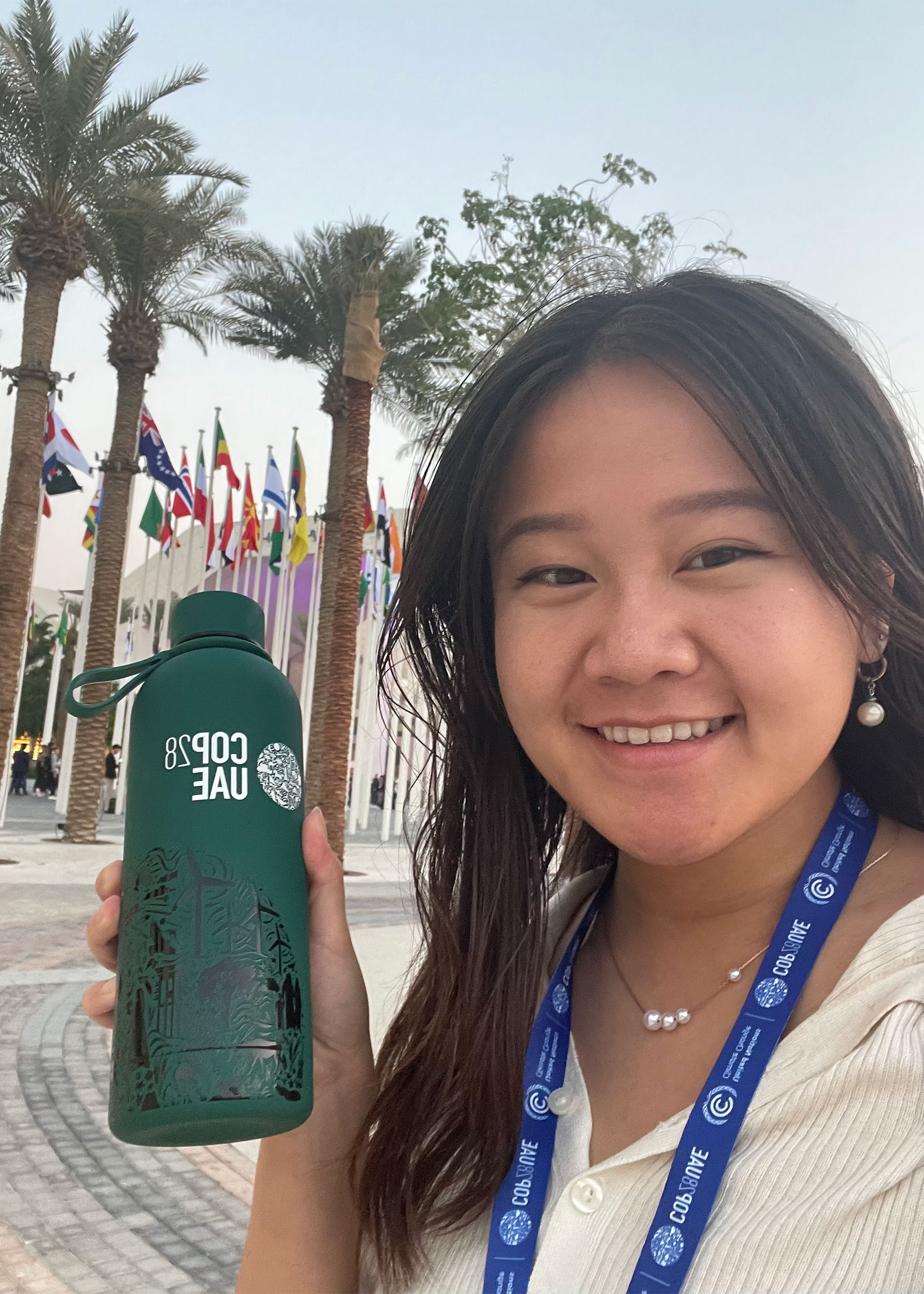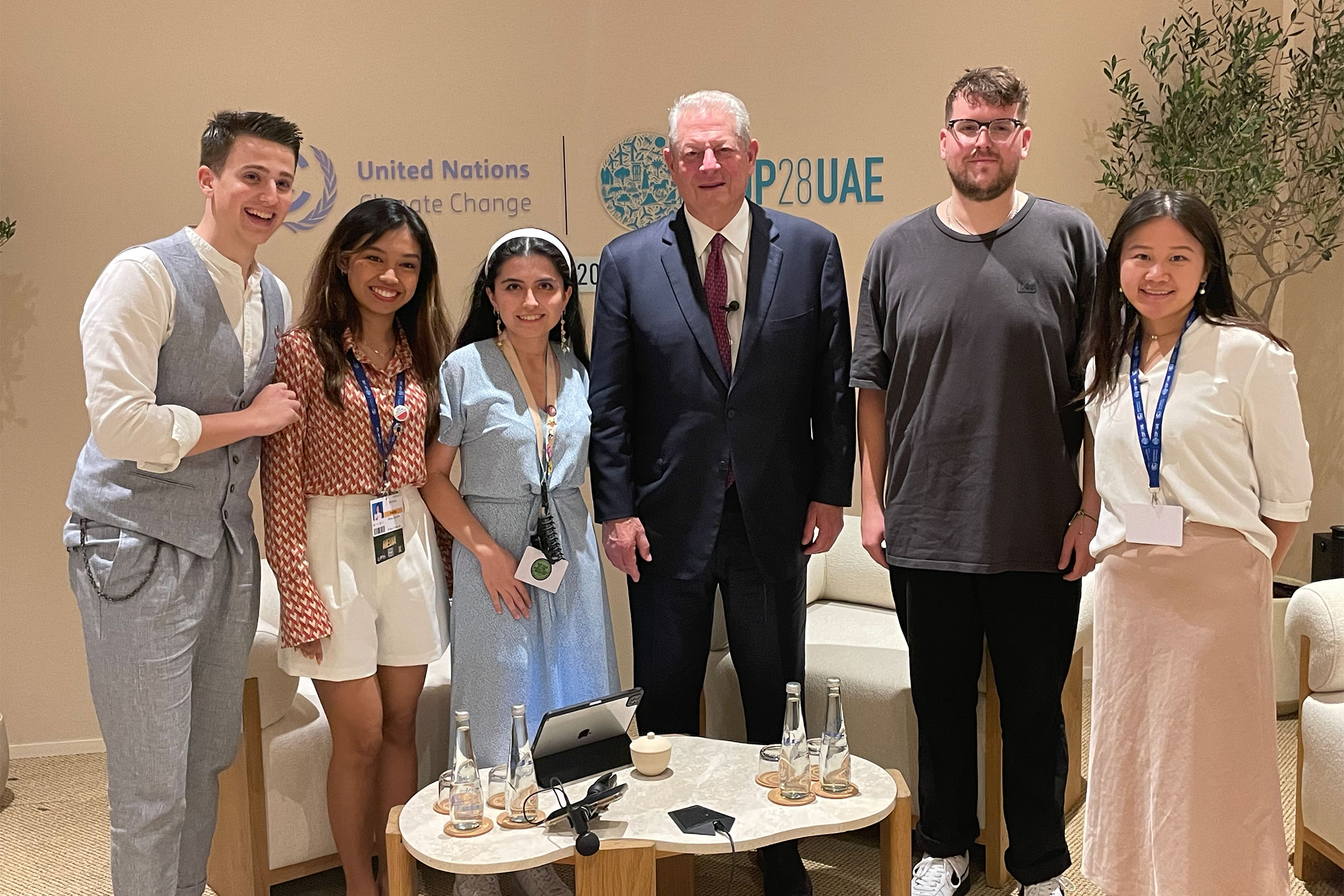
Angela Zhong picked up her COP28 water bottle outside Dubai’s Expo City.
Photos courtesy of Angela Zhong
Letter from COP28
Junior and climate activist Angela Zhong details racing through security lines, talking oil palm deforestation, interviewing Al Gore
Every morning, the mob spilled from the Dubai Expo 2020 Metro Station and rushed across the sidewalk, vying to beat one another to the security line. If a car stopped on Al Wasl Avenue just then, the driver would see hundreds of speed walkers in muted business suits dotted with a sprinkling of cultural or Indigenous garb. With a squint of the eye, they might have picked me out, possibly pulling ahead of a negotiator from Seychelles or elsewhere.
That was my routine every morning at COP28.
The annual global conference, hosted by the UN Framework Convention on Climate Change, convenes scientists, politicians, and other key stakeholders on climate from around the world. For a few days, they join forces with groups from academia, business, media, and the nonprofit world to discuss potential solutions to one of the world’s most pressing problems. As someone who is interested in international diplomacy on the climate crisis, I was incredibly lucky to attend and witness a week of the negotiations.
Harvard College students Joshua Steib ’24 (far left) and Angela Zhong ’25 (far right) met former Vice President Al Gore ’69 with members of the official UNFCCC Youth Constituency media team.

In some ways, COP is just like any other conference. There are technocratic talks and hyper- intentional networking. There are long nights and early days. Even the setting felt as if it could have been part of any number of major metropolitan areas, this one was located in a huge exposition center about an hour’s subway ride from cosmopolitan, downtown Dubai.
Only on the second day did it dawn on me that I was really at COP28. It happened while visiting the Indonesian pavilion, where I was able to casually chat with the staff about my class paper on oil palm deforestation in the region. This sense of awe was furthered as I bumped into high-level officials such as Ali Zaidi ’08, national climate adviser to President Biden.
And then there was my conversation with former Vice President Al Gore ’69.
Professor Michael McElroy, who taught my environmental science public-policy seminar, helped set up an opportunity for me and Joshua Steib, a visiting College student from Germany, to interview Gore, one of the most influential climate activists in the world. The conversation at the event was refreshingly direct, as the Nobel Prize winner lamented the “absurd” decision to allow oil executive Sultan Ahmed Al Jaber to be president of the proceedings. “COP28 is a bit of a rigged system,” he remarked.
The venue, Expo City, was aptly named. Navigating its labyrinth of events felt like traversing a bustling metropolis. I dodged electric buggies while rushing from one event to the next. Around every corner was a new discussion on renewable energy, adaptation strategies, policy negotiations, or grassroots movements. The country pavilions, many of which featured local delicacies or cultural tchotchkes, added a human element to what otherwise could have been an infinite loop of panels and roundtables.
Sweden and Singapore very successfully enticed me to stay for their programs with their open coffee bars, where I met and struck up fascinating conversations with other attendees. My new friends and I all noted how easy it was to miss lunch amid the jam-packed offerings and long lines. The literal and figurative race against time was present in every aspect of the conference.
Legitimate criticisms are levied at such large-scale conferences — accusations of bureaucracy, a lack of tangible outcomes, or the spectacle of it all. For every accomplishment, there is another “but.” The final product of the two weeks may have been the first consensus on the need to transition away from fossil fuels. However, the “phaseout” agreement was punctuated with clarifiers. Defining deadlines such as 2030 and 2050 were sorely needed. Reaching the 1.5-degree target prescribed by the Paris Agreement will require real action; this final statement serves as merely an option to participate.
The negotiations are the focus and the headache of COPs, and few come away entirely happy. But my own pet peeve around COP concerns a general attitude about youth participation that feels dismissive. Questions implicitly asking young people to justify their presence at the conference are still very much the norm. Concerns abound around “youth washing” — inviting younger participants to give the appearance that the voices of coming generations.
Many of my peers have impressed me with their technical understanding of the articles, and their eloquent explanation of the urgency of the issue. That 21-year-olds participate in high-level speaking engagements was unusual even five years ago but now is common. Progress there should be recognized. I would rather have spent this very limited time sharing lived experiences or trading thoughts on the lack of restrictions to new coal licensing instead of talking and thinking about whether we deserved to be there.
But I see this as a growing pain as the international community continues to adopt the newest and loudest constituency. Eventually I was able to refine my answer to questions about youth participation at COP: Why wouldn’t youth be at COP?




